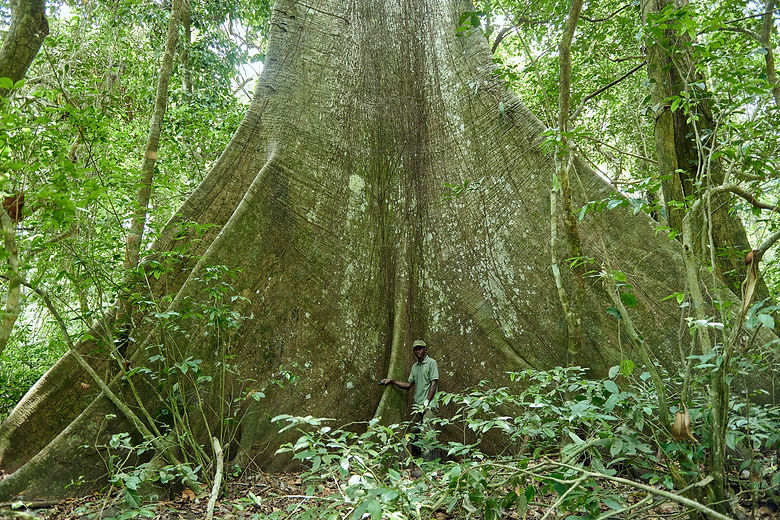

The forests of Edo State are some of the last remaining rainforests left in southwestern Nigeria and support an incredible array of species, including the critically endangered forest elephant. The Okomu landscape, comprised of a mix of a national park and forest reserves, protects critical ecosystems and provides refuge to many other wildlife species including white-bellied pangolin, leopard, forest buffalo, white-throated guenon and red-capped mangabey monkey, yellow-crested hornbill, and African grey parrot. Okomu’s lowland rainforests, swamp forests, mangroves, and waterlogged peat soils are incredibly important carbon stores, and the landscape protects watersheds for several rivers that drain into the Niger Delta including the Okomu, Siluko and Osse Rivers.
THE CHALLENGE
The Okomu region is plagued by illegal logging, unsustainable slash-and-burn agriculture, and insecurity in the riverine southern areas bordering the Niger Delta. Expanding oil palm, rubber, and cocoa plantations put pressure on Okomu’s precious rainforests and bushmeat poaching has reduced wildlife populations dramatically. Underlying these issues is a rural population trapped in a cycle of environmental degradation and poverty, and the region’s once thriving timber industry has collapsed. In 2021, Okomu National Park and Edo State were in the national news because of an epidemic of illegal logging partly due to chronic underfunding of the national park and the wider forest service of Edo State.
ANI AND OKOMU
Following ANI’s success in Gashaka Gumti, we were invited by the National Park Service (NPS) to undertake a similar project in Okomu. In May 2022, ANI and NPS signed a 30-year Partnership Agreement for the protection and development of the 224-square-kilometer Okomu National Park.
At the same time, the Edo State Government was overhauling their forestry sector and asked ANI to review their draft forestry legislation and train a new cadre of forest reserve rangers. They also requested that ANI take over the management of Gilli-Gilli Forest Reserve (363 sq km) and the southern section of Okomu Forest Reserve (378 sq km) which are adjacent to Okomu National Park. In October 2022, ANI signed a 50-year agreement with the Edo State Government awarding us a Biodiversity Conservation and Eco-Tourism Concession for these two forest reserves, bringing the area of land co-managed by ANI in the overall Okomu landscape to just under 1,000 square kilometers. We also signed a Partnership MoU with the Okomu Oil Palm Company that has plantations on the eastern and western edges of Okomu National Park why?.
ANI plans to protect Okomu National Park and the intact parts of Gilli-Gilli Forest Reserve to create a wildlife corridor by working with farmers to link the remaining patches of forest in between the two areas. By partnering with the people in the communities living in and around these areas, the region can promote sustainable development that protects the remaining forests and wildlife.

OUR PROGRAMMES
Creating sustainable parks that benefit everyone.

Habitats and Wildlife
The Okomu Landscape is home to incredible biodiversity that is disappearing from West Africa. ANI is committed to protecting Okomu's spectacular rainforests and the species that call them home. We are using landscape-level management to create the conditions necessary for this protected area to thrive.
Security, Protection and Infrastructure
The restoration of the law enforcement capacity of the region is a priority. Without security, it
is impossible to carry out other activities that are necessary for the project. We have already trained 40 new rangers, and are developing the required infrastructure to support law enforcement efforts throughout the areas that we help manage.


Community Development and Engagement
Uplifting communities through conservation is a key part of ANI's mission, and is critical for the overall success of Okomu. We plan to carry out a comprehensive socioeconomic and needs survey of all the communities in the Okomu and Gilli-Gilli Forest Reserves to understand local demographics and inform our project strategy moving forward.
Sustainable Financing
We want Okomu to drive sustainable economic development in the region and to be able to support itself through its conservation. We plan to develop diverse, resilient revenue streams that provide financing that will continue to protect the landscape.


Monitoring, Research, and Publicity
Research is key for understanding the landscape and how we are having an impact. Collecting and analysing data allows us to adapt management strategies to ensure that what were are doing is providing tangible benefits to the protected area and local communities.

St Nicholas House (10th Floor)
Catholic Mission Street, Lagos, Nigeria
Tel: +234 810 120 4379
E-mail: info@ani-nigeria.org

